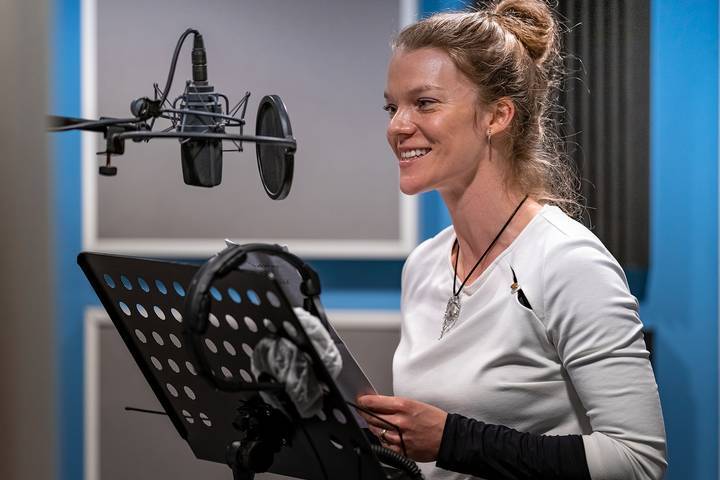Voiceover work is a fascinating field that involves using your voice to convey a message or bring a script to life. From commercials and animations to documentaries and video games, voiceover artists add depth, emotion, and personality to various media.
Voiceover work is an exciting and diverse field that offers numerous opportunities for creative individuals. Whether you aspire to be the voice of a beloved character, promote products through commercials, or narrate compelling stories, the world of voiceover work has a place for you. You can begin a fulfilling career as a voiceover artist by honing your skills, building a solid portfolio, and networking within the industry.
Let’s explore voiceover work, its different types, the skills required, and how to pursue a career in this exciting industry.
1. Defining Voiceover Work

Voiceover services refer to the art and practice of providing a voice for a character, narration, or commentary in various mediums like film, television, radio, advertisements, video games, animations, audiobooks, and more. It involves using the voice to convey emotions, deliver information, or bring characters to life without a physical presence.
It’s a skillful profession requiring vocal talent, acting ability, technical proficiency, and the capacity to interpret and express the desired message through voice alone.
2. Commercial Voiceover

Commercial voiceover work involves lending a compelling and persuasive voice to advertisements. These can be for TV, radio, online videos, or social media ads. The goal is to capture the audience’s attention and convey the message effectively, encouraging them to take action, whether purchasing a product, visiting a website, or engaging with a service.
A commercial voiceover artist must understand the brand and target audience to tailor their tone, style, and pacing accordingly. It’s a dynamic and competitive field that requires versatility, creativity, and the ability to convey the brand’s essence in seconds.
3. Character Voiceover

Character voiceover work brings animated or virtual personas to life through unique and expressive voices. Voiceover artists skillfully embody the personality, emotions, and traits of the character they are portraying, which enhances the character’s believability and allows them to connect with the audience.
These roles range from whimsical creatures in animated films to video game protagonists or voice assistants like Siri or Alexa. You need to be creative versatile, and have a deep understanding of the character’s backstory and traits to infuse authenticity and captivate the audience, making it an exciting and challenging aspect of the voiceover industry.
4. Narrative Voiceover

Narrative voiceover work involves providing a captivating and expressive vocal narration to enhance storytelling. This type of voiceover is prevalent in documentaries, audiobooks, explainer videos, and educational content. The narrator’s role is to engage the audience, guide them through the narrative, and convey emotions and information effectively.
A skilled narrative voiceover artist will enhance the listener’s experience. It’s about not just reading the script but evoking a sense of connection and immersion to make the narrative impactful and memorable.
5. Dubbing and Localization

Dubbing and localization voiceover work involves replacing the original audio in a film, TV show, or video game with a translated script in the target language. This is important for making content accessible to a global audience.
Voiceover artists must synchronize their delivery with the original performance’s lip movements and overall tone to ensure a seamless viewing or gaming experience. It demands linguistic expertise, acting skills, and cultural understanding to convey the essence of the dialogue while matching the original context. Accuracy, timing, and cultural nuances are vital to providing an authentic and relatable viewing experience in different regions.
6. Skills Required for Voiceover Work

Voiceover work demands various skills to succeed in a very competitive industry. Vocal versatility is crucial; you must adapt to various characters, tones, and styles. Clear diction, proper pronunciation, and excellent enunciation are vital for effective communication. Acting skills help in conveying emotions and bringing scripts to life.
Understanding pacing, timing, and the ability to take direction are also necessary. If you are interested in dubbing or localization work, having a keen ear for accents, languages, and nuances is beneficial. Finally, professionalism, discipline, and being a self-starter round out the essential skills for a successful voiceover career.
7. Getting Started in Voiceover Work

To start a career in voiceover work, begin by honing your voice and acting skills. Take acting classes, workshops, and voice training to understand vocal techniques and expressiveness. Build a portfolio with high-quality recordings showcasing your versatility in different styles and tones. Create a home recording setup with a good microphone, soundproofing, and recording software.
Join online voiceover marketplaces or freelancing platforms to find opportunities and gain experience. Network with industry professionals, attend auditions and seek guidance from mentors. Continuous learning, persistence, and professionalism are key to establishing a successful path in voiceover work.

